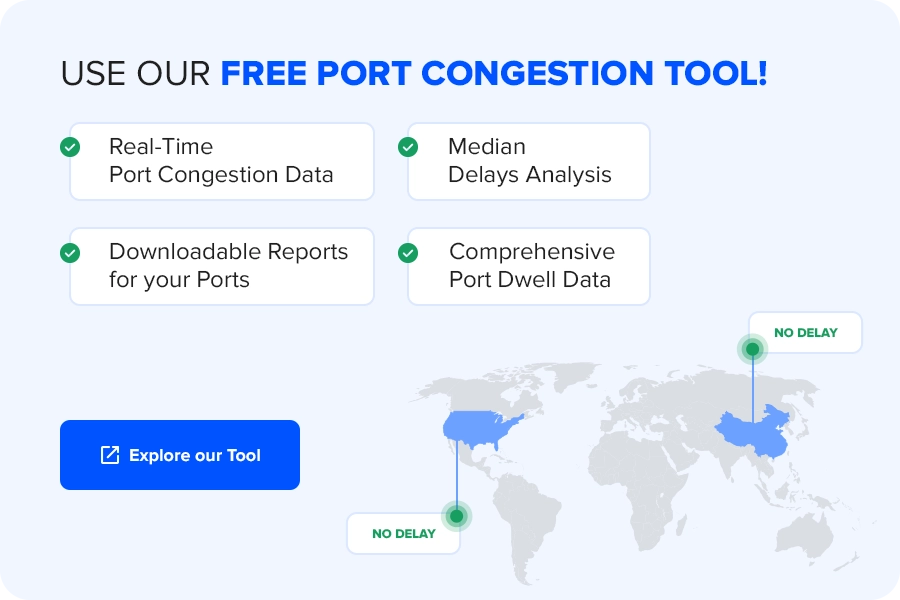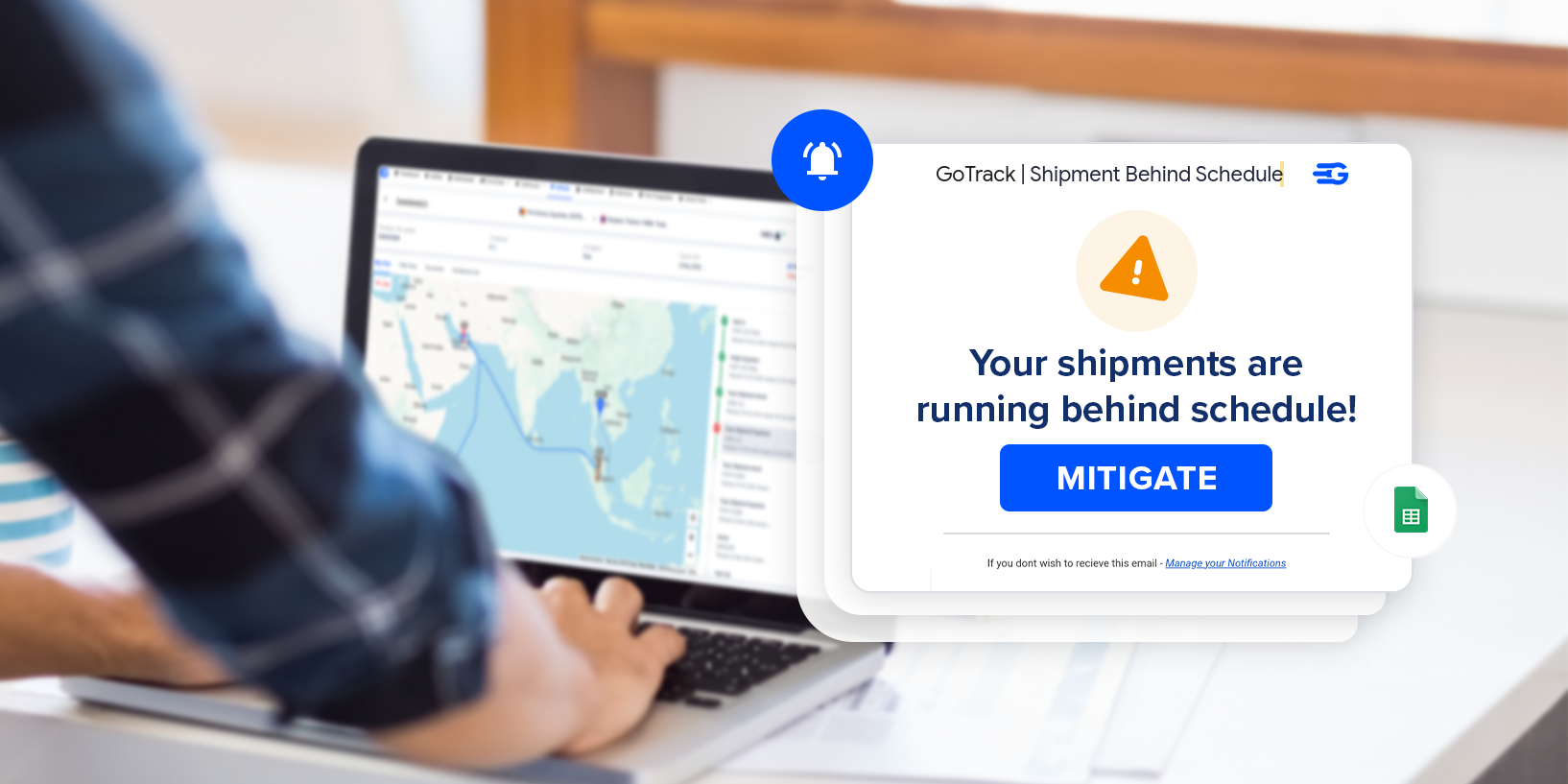Using Data from Shipping Delays to Strengthen Enterprise Supply Chains
In today’s fast-paced global logistics and supply chain landscape, shipping delays can have cascading impacts on businesses. Factors such as port congestion, geopolitical events, and adverse weather conditions can disrupt the timely movement of goods. For enterprises relying on air and ocean freight, understanding and mitigating these shipping delays is critical. Shipment delay alerts play a pivotal role in empowering businesses to anticipate challenges, adapt strategies, and maintain robust supply chain operations.
Common Causes of Shipping Delays
Shipping delays can arise from a variety of factors that impact both ocean freight and air cargo. Understanding these shipping delayed reasons can help enterprises better prepare and use real-time shipment delay alerts effectively.
Adverse Weather Conditions
Severe weather events, such as hurricanes, typhoons, and heavy storms, can disrupt shipping routes and airport operations, causing significant shipping delays. Weather-related disruptions are especially problematic for air cargo; it is what causes delays in air shipments frequently. Heavy fog, snowstorms, and thunderstorms can result in the cancellation or rescheduling of flights, directly impacting timelines.
Labor Shortages and Strikes
Labor shortages are a significant cause of shipping delays. For example, the trucker crisis in Mexico has strained transportation routes, leading to shipment bottlenecks and shipping delays. This crisis has been fueled by a combination of stringent regulatory changes and a shrinking workforce, severely impacting logistics timelines.
Port Congestion
Port congestion occurs when a port becomes overwhelmed with a high volume of vessels waiting to dock, often due to limited docking space, inefficient port operations, or increased demand. As a result, unloading and loading processes are delayed, causing a ripple effect throughout the supply chain. These delays can extend shipping timelines, disrupt delivery schedules, and lead to higher costs for both shipping companies and businesses relying on timely goods delivery. In addition to slowing down cargo movement, port congestion can also create a backlog, making it harder for vessels to secure dock space and further compounding the issue. This congestion can have serious implications for global trade, affecting not just the port in question but the broader logistics network, including air and land transport.

Geopolitical Events
Geopolitical factors can create uncertainty and disrupt shipping schedules, leading to shipping delays. For instance, the U.S. presidential election results have raised questions about potential shifts in trade policies and tariff changes, which can be a shipping delayed reason.
Holiday Seasons and Peak Demand
During holiday seasons or peak shopping periods, increased demand can overwhelm logistics systems, leading to bottlenecks and shipping delays. This is one of the common shipping delayed reasons faced by many enterprises.
Technical Malfunctions and Equipment Failures
Breakdowns of cargo handling equipment or technical issues with transportation vessels can impede the smooth flow of goods and result in shipping delays.
Customs Clearance Issues
Delays in clearing customs, whether due to incomplete documentation or stricter regulations, can hold up shipments at ports and airports, leading to shipping delays This is another example of shipping delayed reasons that enterprises must consider.
What Are Shipment Delay Alerts and How Do They Work?
Shipment delay alerts are real-time notifications that inform enterprises of shipping delays in their ocean and air freight shipments. These alerts are powered by cutting-edge technologies such as IoT sensors, predictive analytics, and AI-driven tracking tools. Unlike traditional manual tracking methods, automated alerts provide accurate, real-time data that help logistics teams respond quickly and efficiently to disruptions.
IoT sensors embedded in shipping containers collect data on location and conditions, while predictive analytics models use historical and current data to forecast potential shipping delays, AI tracking tools aggregate data from various sources, offering enterprises a comprehensive view of shipment statuses and potential risks.
Shipment delay alerts complement manual tracking by ensuring that logistics teams are promptly informed of unforeseen shipping delays, allowing for immediate action and strategic adjustments.

Key Insights from Shipment Delay Alerts to Improve Supply Chains
Identifying Patterns in Shipping Delays
Shipment delay alerts enable enterprises to identify recurring patterns that may impact their supply chains. For instance, frequent shipping delays associated with specific routes, ports, or carriers can be identified through alert data analysis. This insight allows companies to proactively adjust shipping schedules, reroute shipments, or choose alternative carriers to avoid predictable shipping delays and reduce transit times.
Enhancing Inventory and Forecasting Accuracy
Real-time shipment alerts contribute significantly to improving inventory management and forecasting accuracy. By integrating alert data into demand planning systems, enterprises can reduce the risk of stockouts or overstock situations. Real-time updates on delayed inbound shipments allow for dynamic adjustments in inventory strategy, ensuring that supply levels remain balanced and responsive to market needs, even in cases of shipping delays
Evaluating Vendor and Carrier Performance
Shipment delay alerts are not just operational tools; they are strategic assets that provide valuable data on vendor and carrier performance. By monitoring shipping delays attributed to specific carriers or logistics partners, enterprises can assess the reliability and efficiency of these entities. This insight can inform renegotiations of contracts, selection of better-performing partners, and overall enhancement of collaborative efforts.
How Shipment Alerts Align with Long-Term Supply Chain Strategy
1. Proactive Risk Management and Contingency Planning
Shipment alerts contribute to more effective risk management by equipping logistics teams with data to build robust contingency plans. For example, companies can develop response strategies for disruptions such as port blockages or extreme weather events that lead to shipping delays. Leveraging insights from alerts helps identify vulnerabilities in the supply chain, allowing enterprises to fortify these weak points and proactively prepare for potential shipping delays.
2. Strengthening Customer Communication and Trust
Transparency is essential for maintaining strong relationships with stakeholders and customers. Real-time shipment delay alerts enable enterprises to provide timely updates on the status of their shipments and any shipping delays. This proactive communication fosters trust, as customers and partners appreciate being kept informed about potential delays and expected resolution times.
Sustainability and Operational Efficiency
Optimizing supply chain operations through shipment delay alerts contributes to sustainability efforts. By using data to adjust routes and minimize shipping delays, enterprises can reduce unnecessary fuel consumption and emissions. This improved efficiency not only aligns with sustainability goals but also leads to cost savings and a more resilient supply chain.
GoComet Success Stories: How Alerts Transformed Supply Chains
Effective supply chain management relies on real-time visibility, proactive measures, and data-driven insights. One enterprise shipping company revolutionized its operations by integrating GoComet’s innovative solutions, achieving significant improvements in efficiency, customer satisfaction, and cost savings. Here’s how GoComet’s features transformed their logistics strategy:
1. Real-Time Visibility and Streamlined Workflows
GoComet’s centralized dashboard replaced the need to navigate multiple carrier websites, offering a single platform to track all shipments. This real-time visibility allowed the company to identify potential delays, manage exceptions effortlessly, and make informed decisions faster. The streamlined workflows saved time and improved operational efficiency.
2. Automated Notifications for Proactive Response
Timely alerts for shipment delays and exceptions helped the company reduce shipping delays by 20%. These instant notifications enabled swift actions to mitigate disruptions, minimize downtime, and ensure smooth operations, giving them a competitive advantage.
3. Improved Customer Satisfaction with Automated Updates
By automatically informing consignees two days before shipment arrivals, the company enhanced transparency and reduced the likelihood of missed deliveries. This proactive communication strengthened customer relationships and increased trust.
4. Data-Driven Decision Making for Long-Term Success
With access to historical data and tracking reports, the company identified trends, optimized routing, and adjusted inventory strategies. These insights drove cost savings, improved efficiency, and supported sustainable growth.
Through GoComet’s intelligent tracking and alert system, this company transformed its supply chain, achieving resilience and operational excellence.
Shipment delay alerts are invaluable for optimizing air and ocean freight operations and mitigating shipping delays. By providing real-time updates, these alerts empower enterprises to identify patterns, enhance forecasting, evaluate carrier performance, and proactively manage risks. Integrating such alerts into a comprehensive logistics strategy can lead to improved efficiency, strengthened relationships, and the achievement of sustainability objectives. For enterprises looking to enhance their supply chain resilience and reduce shipping delays, adopting real-time shipment alerts is a strategic imperative.







